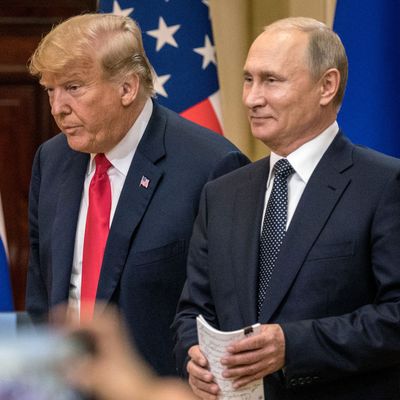
Viktor Medvedchuk and Taras Kozak are two Ukrainian politicians who take pro-Russian positions. Both also own a huge stake worth tens of millions of dollars in a Russian oil refinery. The Organized Crime and Corruption Reporting Project uncovered a blockbuster new detail about their deal: They bought the oil stake for the pitiful sum of just over $40,000.
Russia has a long-standing pattern of making secret arrangements like this one with sympathetic foreign politicians. In the United States, Donald Trump became a subject of suspicion in 2016 because his relationship to Russia bore many of the obvious hallmarks of these other illicit ties. Here was a right-wing nationalist politician awash in secret financial deals with people linked to Moscow, surrounded by men tied to Russia, and regularly espousing what are, by the standards of American political discourse, shockingly Russophilic sentiments.
Everybody knows Trump’s links to Russia set off an FBI investigation and became the subject of compulsive speculation as well as an inquiry by Robert Mueller that failed to deliver the expected goods. This sequence of events was hardened in Republican minds as a “witch hunt,” which Trump’s supporters have used to justify a series of subsequent crimes, including his Ukraine shakedown and efforts to cancel the 2020 election results.
It is true that Mueller failed to establish a criminal conspiracy between Trump and Russia — a difficult crime to prove, if true, made all the more difficult by the refusal of Paul Manafort and Roger Stone to roll on the man who could and did give them criminal pardons. But in the most important way, the investigation did confirm the suspicions about Trump: Russia turned out to have dangled a lucrative business deal to him during the 2016 campaign that worked almost exactly like the payoffs it has secretly offered other foreign politicians.
One reason even some Americans who have no sympathy for Trump looked skeptically at the charge of covert Russian influence is that they were looking at the issue through the lens of American political history. There’s no precedent for anything like the illicit corruption of a major-party presidential candidate. It seems too strange, too wild, to be true.
But if you look at it from the international perspective, it’s completely normal. Russia has spent years shoveling cash under the table to populist, nationalist right-wing politicians in other countries. Over the past decade, Russia has been proved or credibly alleged to have financed nationalist parties in France, Italy, Austria, Greece, Spain, Hungary, the Netherlands, the Czech Republic, and Sweden. And given the incentives for the secrecy of all involved parties, this list is probably not exhaustive.
If we look at Trump’s relations with Russia from this standpoint, it’s not at all difficult to believe his unusual affinity for Moscow and its president had a seedy backstory. It would be strange if it didn’t. Why would Russia pay off so many other nationalist right-wing politicians but not Trump?
The attempted bribe of Trump is a matter of public record: In 2018, Jason Leopold and Anthony Cormier reported for BuzzFeed that Trump was negotiating for a lucrative deal to build an apartment tower in Moscow, reporting that Mueller confirmed. According to the Mueller report, “the Trump Organization stood to earn substantial sums” — in a footnote, it specified that as hundreds of millions of dollars in fees — “over the lifetime of the project, without assuming significant liabilities or financing commitments.”
It’s pretty unusual in the business world to find an investment opportunity that promises massive profits at absolutely no risk. Typically, if they want the chance to make a lot of money, investors need to risk something.
But this attractive no-lose structure turns out to be quite common for business deals made between Russia and its overseas political allies. The deals usually involve an “investment” in some kind of state-controlled commodity. As a German Marshall Fund report on Russian overseas influence explains, “Energy and other commodities are particularly well-suited for malign Russian activity because they are often either difficult to trace or uniquely controlled by the Russian government through state-owned enterprises and loyal organized-crime groups.”
In Italy, BuzzFeed obtained a recording of a conversation between Russian officials and Italian pro-Russian rightists that found them planning a deal by which they would acquire fuel at a discounted rate, giving them an easy $65 million profit. The new Ukraine revelation operated along the same lines as the scheme uncovered in Italy. The pro-Russian pols got the chance to buy into an oil deal at a cheap rate and clear huge returns. “Normally, when you sell a business, it’s done very straightforwardly: You have a seller and a buyer, and the buyer buys the shares for the value of the company,” explained Graham Barrow, a U.K.-based financial-crimes consultant who reviewed the documents for OCCRP. “That doesn’t look like a sensible way of disposing of an asset. It’s a bit like giving your bank balance away for nothing.”
Not all of these deals involve state-controlled commodities. In Sweden, a nativist politician made a deal with a Russian figure that allowed him to buy a house and sell it quickly thereafter for twice what he had paid. Trump’s proposed no-risk investment was a natural fit given his real-estate background. And while the “deal” was ultimately never consummated, it did give Russia two forms of powerful leverage during the campaign: Trump needed to stay in Putin’s good graces lest he blow his lucrative payoff, and he needed Putin to stay secret given his public claims that he had no dealings with Russia.
Trump and his allies have never stopped complaining about the media coverage of the Russia scandal, but that coverage was ultimately framed in a way that benefited him. It focused on the conspiracy that Mueller couldn’t prove and largely ignored the devastating corruption that he did.






























